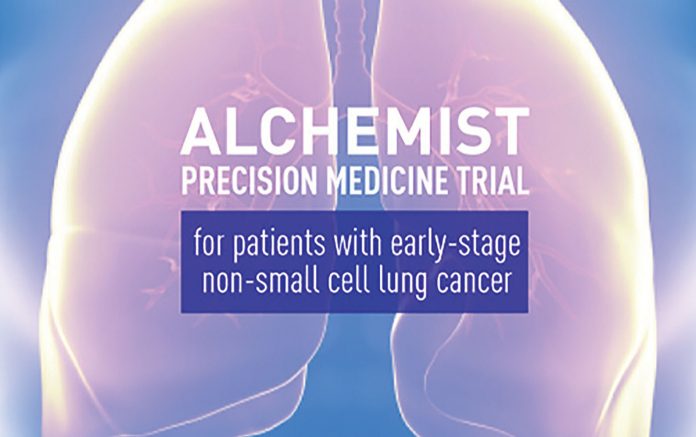By Cynthia L. Kryder, MS
Posted: December 2017
Despite genomic advances in the treatment of advanced lung cancer over the past decade, few breakthroughs have emerged in the adjuvant treatment of patients with resected non-small cell lung cancer (NSCLC) in whom there is a 50% chance that the cancer will recur after standard treatment. Consequently, the US National Cancer Institute initiated the Adjuvant Lung Cancer Enrichment Marker Identification and Sequencing Trial (ALCHEMIST) platform to investigate the role of genomic testing and personalized therapies in the treatment of operable, early-stage NSCLC. The ALCHEMIST trials are investigating the survival benefit of adding erlotinib (Tarceva), crizotinib (Xalkori), and nivolumab (Opdivo) as adjuvant therapy for patients with completely resected NSCLC. EA5142, which focuses on epidermal growth factor receptor (EGFR)- and anaplastic lymphoma kinase (ALK)-negative patients, is the newest study in the ALCHEMIST initiative.1
ALCHEMIST aims to identify actionable alterations in patients with early-stage NSCLC and intends to accrue enough patients to power definitive analyses. Up to 8,000 participants at numerous sites across the United States will be screened. ALCHEMIST is a 4-part trial, with targeted populations broken down as such: screening, approximately 8,000 patients; EGFR, approximately 450 patients; ALK, approximately 378 patients; and immunotherapy, 714 patients.
The ALCHEMIST Platform
The ALCHEMIST platform is a series of integrated clinical trials comprising a screening trial and 3 prospective, randomized, phase III adjuvant clinical trials:2
• ALCHEMIST-Screening
• ALCHEMIST-EGFR
• ALCHEMIST-ALK
• ALCHEMIST-Immunotherapy (EA5142)
ALCHEMIST-Screening
The primary goal of the ALCHEMIST screening trial is to genotype resected nonsquamous NSCLC for molecular abnormalities in EGFR and ALK genes. Patients with pathologically confirmed stage IB (≥ 4 cm)-IIIA NSCLC are enrolled either before or after surgical resection. Patients with EGFR-positive or ALK-positive tumors are offered enrollment in ALCHEMIST-EGFR or ALCHEMIST-ALK, respectively. Patients who are negative for EGFR and ALK mutations or those with squamous histology are eligible for enrollment in EA5142. All patients screened in this trial will be monitored for 5 years.
ALCHEMIST-EGFR
Erlotinib is approved in several countries for use in patients with advanced NSCLC whose tumors harbor an EGFR mutation. ALCHEMIST-EGFR is investigating whether the addition of erlotinib will improve overall survival compared with placebo in patients with early-stage, fully resected, EGFR-positive NSCLC who have completed standard postoperative chemotherapy with or without radiation therapy. Eligible patients are randomly assigned to erlotinib or placebo for up to 2 years or until they experience unacceptable toxicity or a recurrence of their cancer. Patients will be monitored for up to 10 years after treatment.
ALCHEMIST-ALK
Crizotinib is approved in several countries for patients with advanced lung cancer whose tumors test positive for the ALK rearrangement. ALCHEMISTALK seeks to determine whether adjuvant crizotinib improves overall survival versus placebo in patients with earlystage, ALK-positive NSCLC who have completed standard postoperative chemotherapy with or without radiation therapy. Eligible patients are randomly assigned to receive crizotinib or placebo for 2 years. As with ALCHEMIST-EGFR, patients enrolled in ALCHEMIST-ALK will be monitored for up to 10 years after treatment. As of May 2017, both the erlotinib and the crizotinib studies are observation-controlled.
ALCHEMIST-Immunotherapy (ANVIL; EA5142)
Nivolumab is approved for patients with metastatic or recurrent NSCLC whose disease has progressed after platinum chemotherapy. The randomized, phase 3 ALCHEMIST immunotherapy trial, also known as EA5142 or Adjuvant Nivolumab in Resected Lung Cancers (ANVIL), seeks to determine whether immunotherapy with nivolumab improves overall survival and disease-free survival in patients with early-stage NSCLC who have completed standard postsurgical chemotherapy, with or without radiation therapy.
ANVIL will enroll patients with early-stage NSCLC with ALK and EGFR wild-type tumors. Patients with early-stage squamous-type NSCLC also may be enrolled. Central testing for the programmed death ligand (PD-L1) is performed using immunohistochemistry in all patients.
Eligible patients are randomly assigned to nivolumab for up to 1 year or standard of care–observation. Patients are stratified by stage, histology, prior adjuvant treatment, and PD-L1 status (≥1% or <1%). Co-primary endpoints are a 30% improvement in overall survival and/or a 33% improvement in disease-free survival favoring nivolumab. To date, ANVIL has enrolled more than 200 of 714 planned patients; the trial is currently open at more than 500 sites in the United States.
Implications for Practice
The results of the ALCHEMIST trials, as well as other adjuvant therapy trials (see Table 1), have the potential to change the standard of care and improve survival for patients with resected, early-stage NSCLC. Positive results may prompt further investigation into the use of molecular agents in earlier-stage disease. Perhaps most importantly, ALCHEMIST will provide information that will enable researchers to better characterize the actionable mutations found in patients with early-stage NSCLC.

Nevertheless, to meet proposed accrual targets, at least 8,000 patients must be screened. Because the clinical trial participation rate in the United States is only 3% to 6% of eligible patients,3 the US National Cancer Institute is making a coordinated effort to encourage screening and enrollment in ALCHEMIST trials. Regional, multidisciplinary ALCHEMIST teams that include surgeons, medical oncologists, clinical research associates, and patient advocates are working to promote the study and encourage participation.
The ALCHEMIST trials aim to provide a detailed view of the genomic landscape of early-stage NSCLC that could transform the approach to care for a molecularly defined subset of patients. In addition, this trial will define standard practice in the larger cohort of patients whose tumors do not harbor readily identified “actionable” molecular abnormalities. ✦
References
1. Chaft JE, Dahlberg SE, Gerber DE, et al. EA5142 adjuvant nivolumab in resected lung cancers (ANVIL): the newest study in the ALCHEMIST platform. J Clin Oncol. 2017;35(suppl; abstr TPS8575).
2. The ALCHEMIST Lung Cancer Trials [website]. National Cancer Institute. Updated July 24, 2017. https://www.cancer.gov/types/lung/research/alchemist. Accessed July 27, 2017. 3. Cancer Research Institute [website]. Clinical trials. 2017. http://www.cancerresearch.org/cancerimmunotherapy/about-clinical-trials#sthash. 4MOWPCWY.dpuf. Accessed July 17, 2017.
Related Articles
Q&A with Jamie E. Chaft, MD, Regarding the ALCHEMIST Platform
Commentary Regarding Immune Checkpoint Inhibitors
Erlotinib, Crizotinib, Nivolumab: Big Three in ALCHEMIST Platform
Discussing ALCHEMIST with Shakun Malik, MD











